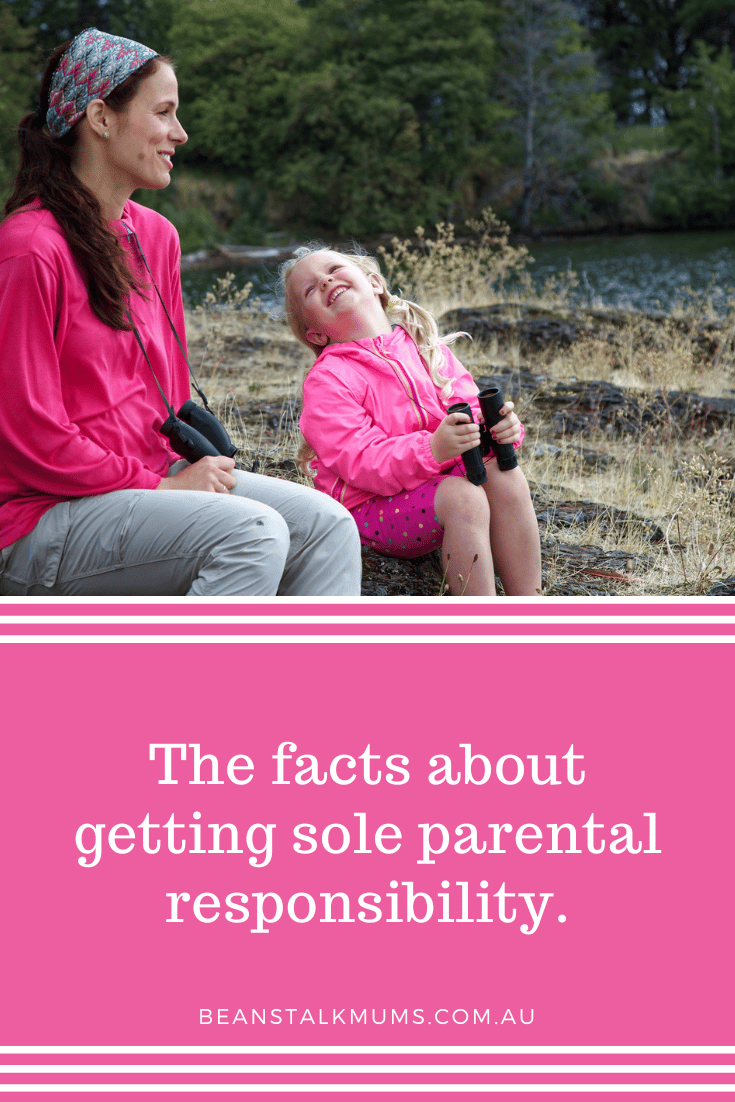
There are lots of reasons single parents consider Sole Parental Responsibility of their child or children.
These might include but are not limited to:
- The other parent is no longer in their lives so it seems right to formalise the situation with an Order of Sole Parental Responsibility
- The other parent is still around but is not focused on the welfare of the child or is putting them at risk
- As co-parents or parallel parents, you are unable to communicate and reach agreements which, in-turn, is effecting the well-being of your child
- You want to define the boundaries around parenting, including parental responsibility and financial commitments
- In some cases, older children in a family separation might ask for this arrangement as it makes them feel safer and in control
Before you start filing papers, you need clarity about what is involved in order to make an educated decision. If you then decide is in your child’s best interest to obtain an Order of Sole Parental Responsibility, this is a matter for the Family Court and there is procedure to follow.
Here is further information about Sole Parental Responsibility and how the family law system works in relation to it.
Sole Responsibility vs. Shared Responsibility
The Family Court system by definition assumes that you and your ex will have equal shared responsibilities when it comes to your child. In the past, this has been known as custody. Even if the child does not live with both parents, they are both responsible for making decisions about:
- Where the child stays
- Health
- Education
- Religion
- Their legal name
A Family Court will assign sole parental responsibility if they determine it is in the best interest of the child to live with only one parent, and that parent will make all major decisions for the child’s welfare until they turn 18 years of age.
However, it does not remove the financial responsibility of providing support for the child from the parent who is no longer part of the Order for Parental Responsibility. For this reason, Child Support can still apply.
How do I get sole parental responsibility?
You must rebut (or change) the court’s presumption that both parents can provide a safe environment for your child to live or visit. The definition of a safe environment includes providing a warm home, food and clothes, but also maintaining a home free from any abuse caused by the ex-spouse, their visitors, or even a part-time caretaker such as sitters.
In order to accomplish this, you must file for a hearing with the Family Court. During several hearings, they will listen to testimony given by all involved parties. When and if the Family Court determines it is best for your child to have only one parent, they will issue a Parental Order of Sole Parental Responsibility.
Factors considered by the Family Court
When the court reviews a case regarding parental orders, they take many parts of the child’s life into consideration. Before they exclude a parent from the responsibilities of raising their child, they must decide that short-term counselling or support would not help the parent retain some of their responsibilities.
The courts may assign an independent children’s lawyer (ICL) to speak to the child and both spouses to obtain a more objective view of the situation before issuing any orders. For their report, they take into account:
- Physical and mental safety of the child
- Ability of both parents to make informed, reasonable decisions for their child and agree
- Ability of both parents to spend meaningful time with the child
- Harmful atmosphere created by disagreements between the parents which leave a lingering negative impact on the child
How hard is it to get sole parental responsibility?
The Family Court functions on the basic concept that a child raised by two parents (even if living separately) will grow into a more stable, happier and healthier adult. To this end, the courts are far more likely to issue a Shared Parental Responsibility order than a Sole Parental Responsibility order.
The courts break down these responsibilities into five major categories:
- Education
- Religion
- Health
- Name
- Changes to living arrangements (that limit time with one of the parents)
Many times, the court issues shared orders. Here, they assign some of the five major decisions to both parents, but not others.
For example, it is possible that you will share their education and religious upbringing, while they assign sole responsibility for the child’s health, name, and living arrangements to one parent. It is uncommon for courts to assign complete sole responsibility simply because one parent is living in a different part of the country.
If you are unable to agree on anything, you must prove to a judge that the parents fail to work together for the good of the child even after attending court-ordered mediation or counselling. You may then be able to obtain a Sole Responsibility Order.
How a Child Custody Lawyer Can Help
While it is possible to file for divorce without using an attorney, fighting for parental responsibilities is a much more challenging prospect. You might consider contacting divorce lawyers who have the experience needed to approach the courts and provide testimony in a manner that can get faster results.
Once you have the legal beagle on your side, don’t hesitate to reach out to the community for emotional support. Other mums are working through this, too.
For sole parental responsibility consent orders examples, the Legal Aid website has some good support.














